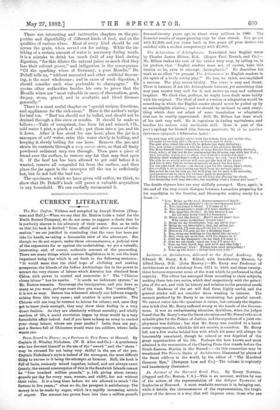The Acharnians of Aristophanes. Translated into English verse by Charles
James Billson, B.A. (Kegan Paul, Trench, and Co.)— Mr. Billson makes the task of his critics very easy, by telling us, in his preface, that " English readers must not, of course, take this version to be, even in attempt, Aristophanic." Ho describes his work as an effort "to present The Acharnians to English readers in the spirit of a lively acting play." He has, we think, accomplished a success. The play moves briskly. The verse is easy and fluent. There is humour, if not the Aristophanic humour, yet something that may pass muster very well for it, and moves an easy and unforced laughter. We think that, perhaps, he might have dealt more boldly with his original. The ideal of such a version or adaptation would be something in which the English reader should never be pulled up by
an unintelligible allusion ; and we should be inclined to omit every- thing which does not admit of some translation or adaptation
that can be readily appreciated. Still, Mr. Billson has done much of his task very well. He is ingenious in finding equivalents, and handles his metres with creditable skill. Here is part of the poet's apology for himself (the famous parabasis, 'Et oti ye X0p01(11V WITTTIKEY Tinryigas SiEcirga.kos V) :— " So now they will quickly arrive with the tribute they owe to the city,
All eager to see him alive, the poet so brave and so witty The poet who risked his own life to Athens her duty declaring ; Yea, now in far countries is rife the fame of his glorious daring. The King himself lately demanded, of some Envoys from Sparta discreet,
First, which of the two States commanded the Grecian seas with her fleet ; And, secondly, which was as often ,:bused by this wonderful poet :
Already their wicked hearts soften to virtue,' he said, ' aad I know it, The aide he so wisely advises will soon get the best of the blows!'
And this is why Sparta devises proposals of peace for her foes ; For she asks back gins—not caring a jot for the island, that's clear, But craftily lo,nt upon tearing our bard from his natural sphere. But never do you let him go, for he'll play out his part with sincerity, And promises all to show the virtuous path to prosperity. Not fawning nor offering bribes, not tricking nor playiug the cheat, Not drenching with long diatribes, but teaching what's honest and meet!"
The double rhymes here are very skilfully managed. Here, again, is the end of the very comic dialogue between Lamachus preparing for his expedition to the frontier, and Dicaeopolis making ready for a
feast
"Law. Bring me the oval, Gorgon-compassed shield! Die. And me the pancake's cheese-encompassed field! L. This insolence is broad. I'll none of it !
D. This broad-cake's good—I'll have another bit!
L. Boy, pour the oil oat I In this bronze I see • An old man being tried for treachery !
D. Bring out the honey ! Here's an old man's face Who curses Lamachus' Gorgon race!
L. Bring me my breastplate, boy, my aid in war ! D. Bring me my breastplate, boy, my gallon jar.
L. Herewith I'll arm myself the foe to rout !
D. Herewith I'll arm me for a drinking bout!
L. Boy, strap my bedding to the shield this minute! D. Boy, strap my meat-box, with the dinner in it !
L. Give me my knapsack—on my back I'll bear it !
D. Give me my cloak—upon my way I'll wear it ! L. Take up that shield, boy, and we'll quit this folly! It's snowing ! Ugh! Things look most melanoholy D. Take up the dinner ; things look very jolly !"


































 Previous page
Previous page